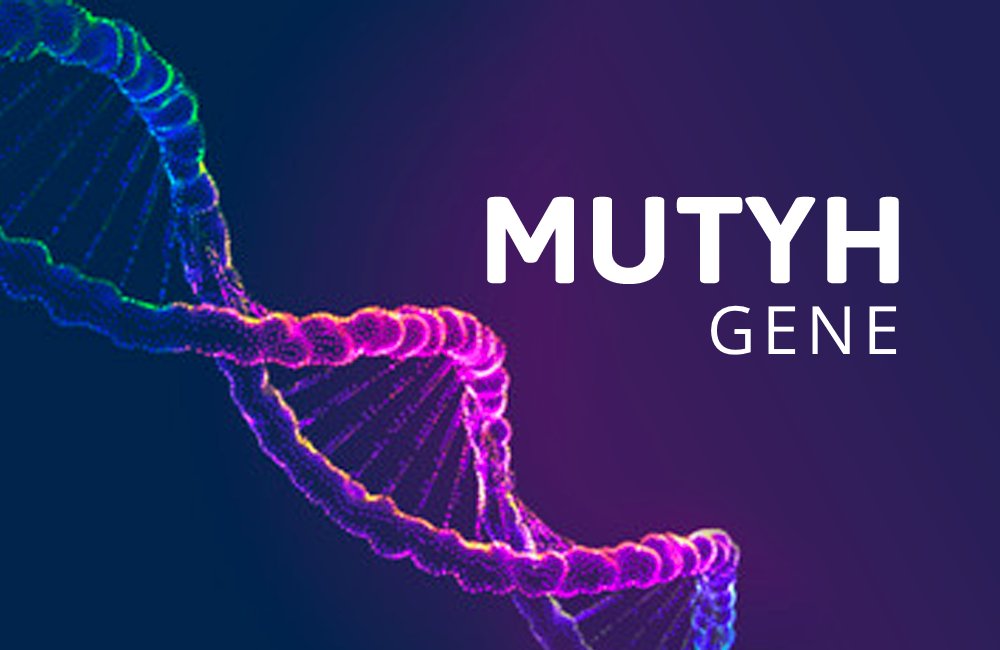This summer, many 23andMe customers will receive access to a new Genetic Health Risk report with information regarding variants in the MUTYH gene. If you were one of the thousands of customers who recently learned that you carry a variant in the MUTYH gene, you may have questions about what this means for you, your health and your family. You may be wondering how worried you should be about this finding. Are there any health concerns for carriers of MUTYH variants? How likely is that you might have a second variant that the 23andMe test missed? Should you seek out additional genetic testing? We’ll get to all of those questions here, but first a little background.
The function and inheritance of the MUTYH gene
They MUTYH gene codes for an enzyme called MYH glycosylase, which is involved in the repair of DNA damage. It is fairly common to be a carrier of one MUTYH variant, and thus have one copy of the gene that isn’t read properly by the body to create the MYH glycosylase. Based on our current understanding however, carrying just one variant doesn’t cause much of any health concern.
The health consequences are greater for those who inherit two variants. Individuals with two non working MUTYH genes have a condition called MUTYH-Associated Polyposis syndrome, known as MAP for short.
MAP is passed on in an autosomal recessive pattern, which means that in order to have the condition, an individual must inherit a non-working gene (aka gene with a pathogenic variant) from both of their biological parents.
It is common for people with MAP to develop many polyps in the large intestine (10 to more than 100 polyps), which significantly increases the risk to develop cancer. Some people with MAP develop colon cancer without ever having polyps.
An estimated 1 in 20,000 to 40,000 people of northern European ancestry have MAP. This means that an estimated 1% – 2% of individuals of northern European ancestry are carriers for MAP.
What does the 23andMe MUTYH report include?
The latest release of the Genetic Health Risk report form 23andMe reports two genetic variants in the MUTYH gene: Y179C and G396D. These two variants are estimated to make up 80%-90% of the total cancer related variants in the MUTYH in individuals of northern European descent.
So what about the other 10-20% of variants that 23andMe doesn’t test for?
It is important to note that there have been >100 important variants discovered in the MUTYH gene that are related to MAP. The 23andMe test only looks at these two specific variants and cannot tell you anything about the other variants in the MUTYH gene.
What if I’m not of northern European ancestry?
The variants included on the 23andMe report are most common in people who are of northern European descent. Variants that are not detected with this test may be even more likely for you.
Are carriers of just one MUTYH variant at an increased risk for cancer?
This question has been debated quite a bit through the years. Our best current estimates suggest that carriers may have a small increased risk, perhaps about a 2-fold of the general population risk, to develop colon cancer. Currently we do not believe that carriers of just one MUTYH variant have an increased chance to develop colon cancer at a particularly young age, and thus no additional or earlier screening beyond what would be recommended based on the individual health and family history is generally recommended.
And how likely is that you might carry a second variant that the 23andMe test would have missed, and thus have MAP?
If you are of northern European ancestry, and were found to carry one of the two variants reported by 23andMe, the chance that you carry a second, undetected variant is about 0.1% – 0.5%. This means that there is a 99.5% – 99.9% chance that individuals reported to have one variant on their 23andMe test don’t have MAP.
Should you consider additional genetic testing?
Some people may benefit from additional testing through a clinical laboratory to assess for variants in the MUTYH gene and possibly other genes. Some people may not find this testing helpful. The importance of further genetic testing may depend on many factors including your personal medical history as well as your family health history. Meeting with an independent genetic counselor can help to clarify this question, and help support you to make an informed decision about your next steps. You can schedule a telehealth appointment with an independent, board certified genetic counselor here, or find a genetic counselor in your local community here.
#MUTYH #MAP #HereditaryCancer #23andMe #Y179C #G396D

